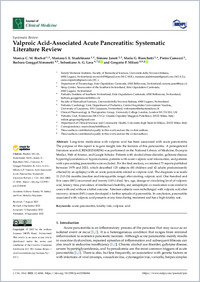Valproic acid-associated acute pancreatitis : systematic literature review
- Bischof, Monica C. M. Institute of Family Medicine, Faculty of Biomedical Sciences, Università della Svizzera italiana, Switzerland
- Stadelmann, Mariana I. E. Institute of Family Medicine, Faculty of Biomedical Sciences, Università della Svizzera italiana, Switzerland
- Janett, Simone Department of Pneumology, Ente Ospedaliero Cantonale, Bellinzona, Switzerland - Sleep Center, Neurocenter of the Southern Switzerland, Ente Ospedaliero Cantonale, Lugano, Switzerland
- Bianchetti, Mario G. ORCID Institute of Family Medicine, Faculty of Biomedical Sciences, Università della Svizzera italiana, Switzerland
- Camozzi, Pietro Institute of Family Medicine, Faculty of Biomedical Sciences, Università della Svizzera italiana, Switzerland
- Goeggel-Simonetti, Barbara Pediatric Institute of Southern Switzerland, Ente Ospedaliero Cantonale, Bellinzona, Switzerland - Faculty of Biomedical Sciences, Università della Svizzera italiana, Switzerland
- Lava, Sebastiano A. G. Pediatric Cardiology Unit, Department of Pediatrics, Centre Hospitalier Universitaire Vaudois, University of Lausanne, Switzerland - Clinical Pharmacology & Therapeutics Group, University College London, UK
- Milani, Gregorio P. Pediatric Unit, Fondazione IRCCS Ca’ Granda Ospedale Maggiore Policlinico, Milan, Italy - Department of Clinical Sciences and Community Health, Università degli Studi di Milano, Italy
- 2023
Published in:
- Journal of Clinical Medicine. - 2023, vol. 12, p. 6044
English
Long-term medication with valproic acid has been associated with acute pancreatitis. The purpose of this report is to gain insight into the features of this pancreatitis. A preregistered literature search (CRD42023438294) was performed on the National Library of Medicine, Excerpta Medica, Web of Science, and Google Scholar. Patients with alcohol abuse disorder, gallstone disease, hypertriglyceridemia or hypercalcemia, patients with acute valproic acid intoxication, and patients with a pre-existing pancreatitis were excluded. For the final analysis, we retained 73 reports published between 1979 and 2023, which described 125 subjects (83 children and 42 adults predominantly affected by an epilepsy) with an acute pancreatitis related to valproic acid. The diagnosis was made 11 (3.0–24) months (median and interquartile range) after starting valproic acid. One hundred and five cases (84%) recovered and twenty (16%) died. Sex, age, dosage or circulating level of valproic acid, latency time, prevalence of intellectual disability, and antiepileptic co-medication were similar in cases with and without a lethal outcome. Nineteen subjects were rechallenged with valproic acid after recovery: sixteen (84%) cases developed a further episode of pancreatitis. In conclusion, pancreatitis associated with valproic acid presents at any time during treatment and has a high fatality rate.
- Collections
- Language
-
- English
- Classification
- Medicine
- License
- Open access status
- gold
- Identifiers
-
- DOI 10.3390/jcm12186044
- ARK ark:/12658/srd1331820
- Persistent URL
- https://n2t.net/ark:/12658/srd1331820
Statistics
Document views: 75
File downloads:
- Bianchetti_2023_MDPI_jcm_Valproic Acid-Associated Acute Pancreatitis: 21
